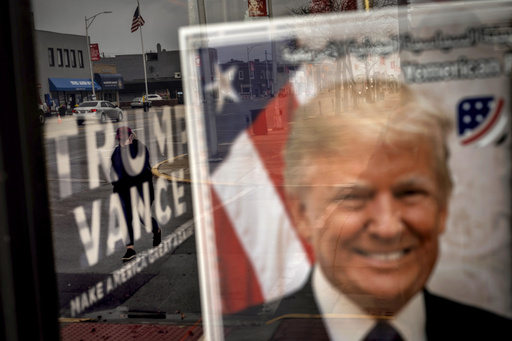
DEARBORN, Mich. — With limited options that did not appeal to her, Suehaila Amen chose to support a third-party candidate during the presidential election instead. The experienced Democrat from Dearborn, Michigan’s significant Arab American community, lent her voice to a trend that aided Donald Trump in reclaiming both Michigan and the presidency.
In Dearborn, where approximately half of the city’s 110,000 residents are of Arab heritage, Trump outperformed Vice President Kamala Harris by over 2,500 votes, marking the first time a Republican candidate has won the city since George W. Bush in 2000. Trump also triumphed over Harris in nearby Dearborn Heights, despite having previously implemented travel restrictions impacting several predominantly Muslim nations during his presidency.
Harris’s defeat in two Detroit-area cities with prominent Arab American populations came after persistent concerns were voiced by local Democrats regarding the Biden-Harris administration’s steadfast backing of Israel during the ongoing Gaza conflict. Some voters expressed support for Trump after his visit shortly before election day, during which he engaged with patrons at a Lebanese restaurant, assuring them of his commitment to seeking peace in the Middle East.
While Amen could not bring herself to endorse Trump, she noted that many in the Arab American community believed Harris had received her just deserts, though they were not “excited” about Trump. “Whether it’s Trump himself or the people around him, it does cause me great concern,” she remarked. “But when you face two unsatisfactory choices, what alternatives do you really have?”
As the election results unfolded late Tuesday into Wednesday, it became apparent that not only was Trump winning the presidency but that he would likely emerge victorious in Dearborn as well. Dearborn City Council member Mustapha Hammoud described the reaction among metro Detroit’s Arab American residents as “somber,” yet he added that the outcome was “not surprising at all.”
The outcome in Dearborn, where Trump received nearly 18,000 votes compared to Harris’s 15,000, contrasts sharply with just four years ago, when Joe Biden secured a victory in the city by a margin of nearly 3-to-1.
Expectations of this result were not unfounded. For months, local leaders had communicated with distinguished Democratic officials, candidly warning that the Arab American electorate might withdraw its support if the administration did not modify its approach to the Israel-Hamas conflict. Since the devastating Hamas attack on October 7, which claimed the lives of 1,200 Israelis and took over 200 hostages, the Biden-Harris administration has maintained close ties with Israel. According to Palestinian health officials, the ongoing conflict has resulted in over 43,000 deaths in Gaza without distinction between combatants and civilians.
Despite Harris’s attempts to moderate her stance on the issue, she failed to propose specific policies that diverged from the administration’s established position regarding Israel and the war in Gaza. Residents like Hammoud suggested that simply halting the hostilities in Lebanon and Gaza would have secured widespread support for Harris.
Polling data revealed that a majority of voters believed Trump would be more adept at managing Middle Eastern affairs than Harris, with about half citing Trump as preferable, contrasted with roughly a third who saw Harris as better suited. Among those opposed to increasing support for Israel, 58% sided with Harris while 39% favored Trump.
Notably, even some individuals who cast their votes for Harris expressed uncertainty. Approximately three-quarters of her supporters believed she was the more capable candidate in dealing with the situation, although a significant number indicated that neither candidate was favorable to them.
Amidst the lack of enthusiasm for Harris within the Arab American community, Trump and his supporters were quick to engage. Arab Americans constituted an important voting bloc in Michigan—the state Trump narrowly won in 2016 before losing it by a considerable margin to Biden in 2020. Community leaders spent considerable time meeting with Trump associates, and endorsements began materializing following the Democratic Muslim Mayor of Hamtramck, Amer Ghalib, announcing his backing for Trump.
In September, after Trump visited a campaign office in Hamtramck, there was a notable shift. “They felt respected following the president’s visit,” said Massad Boulos, who facilitated Trump’s outreach efforts towards Arab Americans, indicating that endorsements from local imams and leaders started to follow.
The campaign’s concluding week marked a decisive moment for many voters. Former President Bill Clinton’s remarks during an October 30 rally in Michigan, which criticized Hamas’s actions, resonated negatively with many members of the community. The Harris campaign had sought to arrange a visit from Clinton to Dearborn afterward; however, backlash from his comments led to the cancellation.
A resident named Amin Hashmi, who identifies as a strong Democrat, noted the impact of Clinton’s statements on his voting choice, referring to his decision to support Trump as a substantial shift for him, which involved deep contemplation at the ballot box.
Trump’s visit to The Great Commoner, a Lebanese restaurant in Dearborn just days before the election, contrasted sharply with Harris, who met with the Democratic mayor, Abdullah Hammoud, but did not physically visit Dearborn herself. “Trump directly interacted with residents. Some may question his sincerity, but he made the effort to engage,” remarked Samia Hamid, a local resident.
Amen observed that many voters at polling locations in Dearborn anticipated either casting votes for third-party options or supporting Trump due to his outreach and acknowledgment of their community.
Though the Arab American vote did not secure Trump’s presidential victory, its significance loomed in voters’ minds, particularly with the anticipation of his promise to seek an end to the ongoing conflict. Additionally, they aimed to see if Trump’s next term would diverge from the previous one characterized by a travel ban affecting Muslim-majority nations. His rhetoric on this subject remained inconsistent, with some indications that he might extend the ban.
Osama Siblani, the publisher of the Arab American News in Dearborn, expressed that the community would hold Trump accountable during his administration. “We managed to navigate through the first four years,” he said, adding, “We will endure the next four.”
